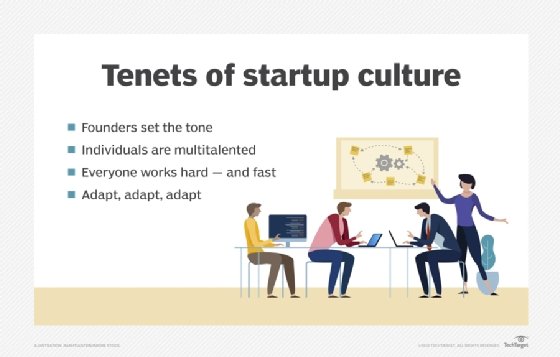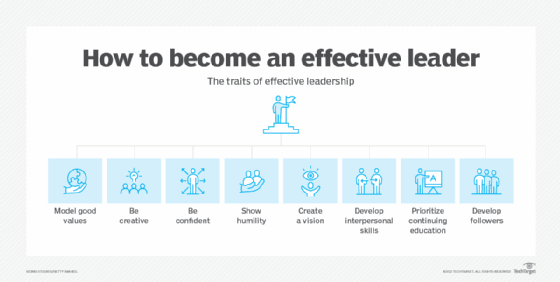startup culture
What is startup culture?
A startup culture is a workplace environment that values creative problem-solving, open communication and a flat hierarchy.
At its core, startup culture emphasizes agility, risk-taking and a collaborative work environment. Startups often operate with limited resources but with a laserlike focus toward solving problems and disrupting established industries.
In today's rapidly evolving business landscape, startup culture plays a pivotal role in driving innovation, fostering entrepreneurship and shaping industries. By understanding the essence of startup culture, professionals can gain insights into how startups operate and harness the power of this dynamic work environment.
Key characteristics of startup culture
The essence of startup culture lies in a distinct set of key characteristics that define the working environment, mindset and values of startups.

Understanding these characteristics is key to comprehending the inner workings and unique dynamics of startup culture.
Innovation and creativity. Startups thrive on innovation and push the boundaries of what is possible. They encourage a culture that fosters creative problem-solving, challenges conventional thinking and fosters a willingness to take calculated risks.
Entrepreneurial mindset. A fundamental aspect of startup culture is the entrepreneurial mindset. Individuals in startups exhibit a proactive, resourceful approach, embracing ambiguity and tackling challenges head-on. They display a "can-do" attitude, constantly seeking new opportunities and solutions.
Fast-paced environment. In startup culture, speed is of the essence. Startups operate in a fast-paced environment where time is a critical asset. Decisions are made swiftly, and adaptability is key to keep up with market demands and evolving customer needs.
Flat organizational structure. Unlike traditional hierarchical organizations, startups typically adopt a flat or decentralized organizational structure. This structure promotes open communication, collaboration and shared responsibility. It enables individuals to contribute their ideas and participate in decision-making.
Emphasis on teamwork. Collaboration is at the heart of startup culture. Startups recognize that effective teamwork is essential. Cross-functional teams work closely together, using their diverse skills and expertise to tackle complex challenges. Shared goals and clear communication from effective leaders encourage camaraderie and pride in collective achievement.

Impact of startup culture
Startup culture has a profound impact on the business landscape, driving innovation, attracting top talent and fueling economic growth. By adopting a unique set of values and characteristics, startups can disrupt established industries, motivate employees and shape the future of entrepreneurship.
Startup culture is synonymous with innovation and disruption; it encourages individuals to challenge the status quo, think boldly and pursue unconventional ideas. By promoting out-of-the-box thinking and risk-taking, startups have the power to revolutionize industries, introduce groundbreaking technologies and redefine business models.
Another significant impact of startup culture is its ability to drive employee engagement and motivation. Startups offer a work environment that empowers individuals, giving them autonomy, responsibility and a sense of purpose.
The opportunity to contribute meaningfully to a high-growth organization infuses a strong sense of ownership and commitment among employees. Engaged employees are happy to invest their energy into driving success, delivering exceptional performance and achieving ambitious goals.
Startup culture also acts as a magnet for top talent seeking a challenging, dynamic work environment. Working in a startup often offers the chance to make a significant impact, take on varied responsibilities and be part of a rapidly growing organization.
The prospect of professional growth, innovation and the freedom to experiment draws individuals who thrive in an entrepreneurial setting. This influx of talent fuels the continuous cycle of innovation, helping startups meet and exceed their goals.
Startup culture helps more than individuals; it also plays a role in economic growth and job creation. By creating new products, services and business models, startups spur economic development, generate wealth and create jobs.
Often at the forefront of technological advancements and disruptive innovation and ideas, startups contribute to the expansion and evolution of industries. The ripple effect extends to local and global economies, generating prosperity broadly.
Challenges for startup cultures
While startup culture offers numerous advantages, it has its challenges. Rapid growth can strain resources and require management to navigate scaling while keeping the startup culture intact. Effective leadership is crucial for maintaining a clear vision, nurturing a positive culture and managing change. By embracing openness, entrepreneurship and a collaborative mindset, startups are poised to drive the innovations that shape our economy. Professionals who know how startup culture works and are aware of its profound impact are well positioned to advance innovation in their own organizations and keep them competitive even in changing or difficult circumstances.
Explore the differences between a startup culture and an established company's work environment.







